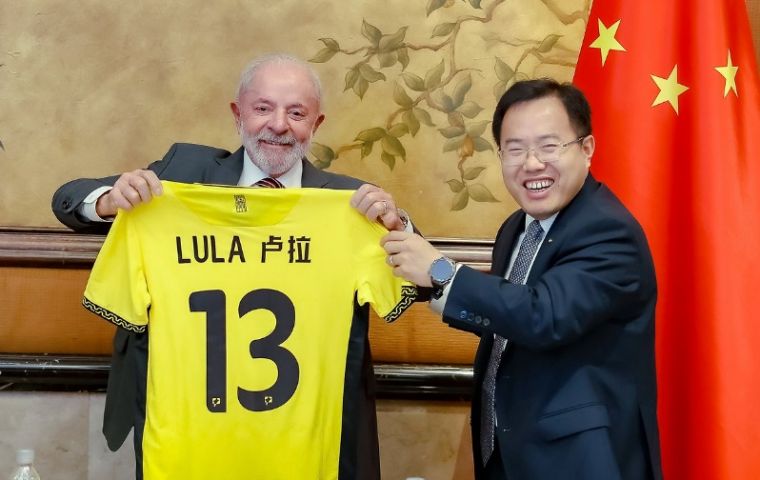MercoPress. South Atlantic News Agency
Lula announces sizeable Chinese investments in infrastructure
 Lula made those remarks at a Sino-Brazilian Business Forum in Beijing
Lula made those remarks at a Sino-Brazilian Business Forum in Beijing Brazilian President Luiz Inácio Lula da Silva announced Monday that Chinese investors would be allocating some R$ 27 billion (US$ 4.69 billion at the current exchange rate) to infrastructure and other development in the South American country. He made those remarks during his participation in the Brazil-China Business Forum in Beijing. The investments will also cover the areas of education and technology, it was explained.
According to the Palácio do Planalto, Lula's recent meetings will contribute to furthe expand Chinese investments in Brazil. The new agreements provide for investments of US$ 1 billion in the production of renewable aviation fuel (SAF) from sugar cane, and the creation of a Research and Development Center (P&D) in the area of renewable energy.
In his closing speech at the forum, Lula emphasized that the bond between Brazil and China was not a “common relationship” but one of “two countries committed to solving the problem of impoverishment that has marked the lives of both” for a long time.
“It is remarkable that China has lifted, in 40 years, 800 million people out of poverty. Just as it is remarkable that Brazil, in just 10 years, has lifted 54 million people out of poverty in my country,” said Lula.
In Lula's view, these facts are a consequence of the inclusion of a significant part of the population in the economy of these countries.
Brazil and China are “strategic partners and uncontrollable actors” in the current geopolitical context, amid the “resurgence of protectionist tendencies,” Lula also said.
“We are committed to reducing trade barriers, and we want more integration,” he further noted. Brazil and China still have the challenge of expanding the exchange of tourists, and to this end, new air connections between the two countries are planned.
The Brazilian president recalled that, in November last year, during a meeting with Chinese President Xi Jinping, synergies were established between the development projects of the two countries. “Today, we are harvesting the first fruits of this work,” he stressed.
“The Virtual Center for Research and Development in Artificial Intelligence, the result of the partnership between Dataprev and Huawei, will be essential for the development of applications in agriculture, health, public safety, and mobility. Telebras' partnership with Spacesail will expand the supply of low-orbit satellites and bring the Internet to more Brazilians, especially those living in more remote areas,” Lula also pointed out.
The president also mentioned eight agreements providing for the transfer of technology in the production of medicines, active pharmaceutical ingredients, vaccines, and medical equipment. In addition, he highlighted the cooperation between Senai Cimatec and Windey, which will result in the installation of a Research and Development Center for solar and wind energy and supply systems.
“China's experience in the refining of critical minerals will contribute to the valorization of production in our territory, including the transfer of technology in the assembly cycles of electric batteries. We have abundant reserves of rare earths, lithium, niobium, cobalt, copper, graphite, uranium, and titanium,” said Lula.
Lula also spoke about the East-West Railway Corridor, which will “be a fundamental undertaking for Brazilian logistics and one of the most transformative for guaranteeing food security in the world.”
“Connecting the Atlantic and Pacific oceans, through five integration routes, will facilitate trade and bring more development to the interior of the South American continent. The bioceanic routes will reduce the distance between Brazil and China by approximately 10,000 kilometers,” he added.
Technological advances will demand specialized professionals, Lula also recalled. “It is important to remember that people will not be competitive in the technological world, in the digital world, if they do not invest in education; if they do not invest in engineering, mathematics. The ideal for Brazil is not to be exporting [only] soybeans. It is to export intelligence and knowledge,” he underlined.
Hence, “we have to invest in education, as the Chinese did. Ask the Chinese how many millions of engineers they have trained in recent years. That's the technological revolution [with] which the Chinese are presenting themselves to the world,” Lula insisted.
For those who claim that Brazil only exports primary goods and iron ore, Lula claimed that such sales, while positive, were the result of a lack of investment in education. “Brazil needs to thank God for exporting agribusiness, because people also need to know how much technology there is today in a gram of soybeans. And how much genetic engineering there is in a kilo of meat or of beef, pork, or in a sack of millet,” he argued.
“We have to export agribusiness and use this money that comes in to invest in education, so that we can be competitive with China in the production of electric cars, in the production of batteries, in the construction of artificial intelligence. No one is going to thank us Brazilians for that,” Lula concluded. (Source: Agencia Brasil)




Top Comments
Disclaimer & comment rulesCommenting for this story is now closed.
If you have a Facebook account, become a fan and comment on our Facebook Page!